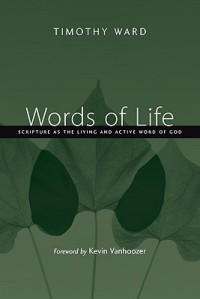 Words of Life by Timothy Ward. Downers Grove: InterVarsity Press, 2009.
Words of Life by Timothy Ward. Downers Grove: InterVarsity Press, 2009.
Summary: This book is a Reformed treatment of the doctrine of scripture that begins from a study of scripture’s teaching about itself, moves to a Trinitarian theology of scripture and finally explores the classical affirmations about scripture. Another significant aspect of this book is its incorporation of “speech-act” theory which Ward uses to delineate the relationship of God and the Bible.
Many Reformed treatments of the doctrine of scripture begin with assertions concerning the necessity, sufficiency, clarity, and authority of the Bible. Timothy Ward gets there in the end but pursue a different approach from what I’ve typically seen. He begins by discussing the question of the relationship between God and the Bible, and the issue of how we speak of the Bible as “The Word of God” while lapsing neither into bibliolatry nor elevating the Bible to be a fourth member of the Godhead.
He then begins by looking at scripture’s own account of itself as reflecting the “speech act” of God for the salvation of his people. He summarizes this as follows:
“God chooses to present himself to us, and to act upon us, in and through human words that have their origin in him, and that he identifies as his own. When we encounter those words, God is acting in relation to us, supremely in his making a covenant promise to us. God identifies himself with his act of promising in such a way that for us to encounter God’s promise is itself to encounter God. The supreme form in which God comes to encounter us in his covenant promise is through the words of the Bible as a whole. Therefore to encounter the words of Scripture is to encounter God in action” (p.48).
The second part of the book then looks at the relationship of each person in the Trinity to scripture. This is then followed by a chapter on the doctrine of scripture under the headings of necessity, sufficiency, clarity and authority. Laid out this way, these qualities are informed by and follow as implications of the idea of scripture as the speech action of God. Particularly helpful here was the author’s discussion of what clarity does and does not imply.
The final chapter considers the Bible in the life of Christians. Ward has some trenchant remarks differentiating sola scriptura from a more contemporary version in evangelicalism of solo scriptura. He also addresses the role of the Christian community in relation to scripture and the particular dynamic that occurs when scripture is read and exposited in which the Spirit-given scripture, the Spirit informed and empowered preacher, and the Spirit indwelt congregation come together and God’s people indeed hear a word from God, and not simply human teaching.
This book is an exposition of a Reformed view of scripture at its best. The author draws heavily on Calvin, Turretin, Warfield, and Bavinck while addressing contemporary criticisms and using contemporary approaches to give a fresh account of the doctrine of scripture. Often, contemporary critics of the Reformed view knock down a “straw man” version of this doctrine. I would suggest it would be far more constructive to engage this account. At a personal level, reading this book nourished my enthusiasm for reading the scriptures alone and together with others, and for the preaching of these “words of life.”
Pingback: The Month in Reviews: June 2015 | Bob on Books